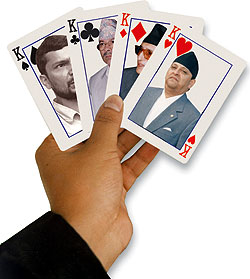 A month into the ceasefire, Nepalis are now getting used to "normalcy". Making the people regard normalcy as the norm is the best way to guard the peace process from being derailed. To be sure, this is not yet peace. It is just an absence of conflict. This phase is necessary to lay down the pre-condition for the negotiations that lie ahead.
A month into the ceasefire, Nepalis are now getting used to "normalcy". Making the people regard normalcy as the norm is the best way to guard the peace process from being derailed. To be sure, this is not yet peace. It is just an absence of conflict. This phase is necessary to lay down the pre-condition for the negotiations that lie ahead. There are lessons for us from the Sri Lankan peace process where a ceasefire has held now for over a year (see: "Prabakaran and Prachanda", #133). If two sides in a 20-year-war with 70,000 deaths marked by indiscriminate attacks on civilians, extreme ethnic polarisation and decades of bad blood can agree on a negotiated solution there is no reason why we can't. It is better to find a solution now than to wait for the war to drag on for another 25 years. If negotiations are the only way, then it is infinitely wiser for Nepal's warring parties to do so now rather than after 100,000 Nepalis are killed.
The Sri Lankan peace process was most fragile during its first two months. But the reason it held was because it fulfilled two main criteria: a) hearts were in the right place in the leadership of both sides, b) and there were good managers guiding and facilitating the peace process.
Of course, the post 9/11 international situation was a factor because it dried up the Tigers' source of diaspora dollars. The one person who deserves most credit for the peace process is Prime Minister Ranil Wickremesinghe, who has been hands-on in making the initial overtures, and steering the process from day-to-day. Wickremesinghe knows that Sri Lanka's war-weary public is a peace constituency far more powerful than the southern chauvinists and political forces who feel left out. On the other side, there are rogue elements among the Tigers, like the eastern commander Karuna, who has been implicated in the arms smuggling incident last month.
If Wickremesinghe hadn't been in politics, he would have been a journalist. He is media savvy and his press management skills have contributed to moderating extreme views. The Norwegian mediators got both sides to agree on media guidelines preventing the parties from playing to the gallery. In Kathmandu, the guidelines are still doing the rounds and despite some belligerent posturing the ceasefire is on track.
In Sri Lanka, as in Nepal, there are cynics and skeptics who voice concerns about a sellout. In January, Wickremasinghe told them, "Those who make their living out of the war, like arms dealers and war correspondents better find other businesses. The economy will improve with peace, and there will be enough opportunities for everyone. No one should try to sabotage peace." That is good advice to the detractors of our own peace process as well.
The Sri Lankan model of using international facilitators has advantages. The main pre-requisite is to have the necessary political will at the highest levels on both sides for a negotiated solution, but once that is achieved the role of a neutral mediator can be helpful. Conflict mediation is a technical skill, you need experts who can find ways around entrenched, intransigent positions. In many cases it is a question of semantics, in others it is a carefully calibrated compromise position acceptable to both sides. This is best done by people who don't have a stake-outsiders who have the experience and the perspective to find the middle path.
In the secret pre-negotiation negotiations going on at present between the government coordinator and the Maoists, it is King Gyanendra who is acting as the final arbiter. But he is an interested party, and the Maoists want the first round of talks with him so they can guarantee themselves a berth in an interim government. This is why it may be wiser in the long run to have mediators who can steer the process: it has worked well so far in Aceh and Sri Lanka.
But, in the end, it is up to us. It is the Nepali people who have to force their leaders to make the ceasefire stick, not be rattled by violations, make the peace process stay on course and never lose sight of the goal: a tolerant and inclusive new Nepal with social justice and economic progress.
The main lesson from Sri Lanka is this: war mongers have no political future when the people overwhelmingly yearn for peace.


